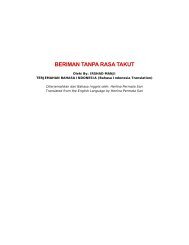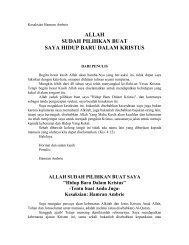A Critical Analysis of 'Real Islam'. Its People ... - Bukti dan Saksi
A Critical Analysis of 'Real Islam'. Its People ... - Bukti dan Saksi
A Critical Analysis of 'Real Islam'. Its People ... - Bukti dan Saksi
Create successful ePaper yourself
Turn your PDF publications into a flip-book with our unique Google optimized e-Paper software.
making them pay a ransom, for the most advantageous choice for the Muslims, and the wisest for Islam. The<br />
ransom imposed upon them is not to consist either <strong>of</strong> gold, silver, or wares, but is only in exchange for Muslim<br />
captives…" [37]<br />
Ibn Abi Zayd Al_Qayrawani (d. 996), head <strong>of</strong> the North African Maliki school at Qairuan:<br />
"There is no inconvenience to kill white non-Arabs who have been taken prisoner". [38]<br />
The famous Syrian jurist Ibn Taymiyya (d. 1328) <strong>of</strong> the Hanbali school under the Mamluks:<br />
"…If a male unbeliever is taken captive during warfare or otherwise, eg., as a result <strong>of</strong> a shipwreck, or because<br />
he has lost his way, or as a result <strong>of</strong> a ruse, then the imam may do whatever he deems appropriate: killing him,<br />
enslaving him, releasing him or setting him free for a ransom consisting in either property or people. This is the<br />
view <strong>of</strong> most jurists and it is supported by the Koran and the Sunna…" [39]<br />
These rulings had tangible consequences. For centuries, from the Iberian Peninsula to the Indian<br />
subcontinent, jihad campaigns waged by Muslim armies against infidel Jews, Christians, Zoroastrians,<br />
Buddhists and Hindus, were punctuated by massacres, including mass throat slittings and beheadings <strong>of</strong><br />
captives. Here are but a few examples. Non-Muslim (i.e., Christian) prisoners were beheaded, summarily,<br />
during a jihad campaign against Tripoli in the mid-7th century, as chronicled by Ibn Khaldun in his,<br />
History <strong>of</strong> the Berbers and the Moslem Dynasties <strong>of</strong> Northern Africa:<br />
"Abd-Allah set siege to the city [Tripoli]; but later, unwilling to let himself be diverted from the goal that he had<br />
in mind, he gave the order to break camp. While we were making our preparations, we spied some vessels that<br />
had just landed on the shore; immediately we attacked them and threw into the water anyone who was aboard.<br />
They put up some resistance, but then surrendered, and we tied their hands behind their backs. They were four<br />
hundred in number. Abd-Allah then joined us, and he had their heads cut <strong>of</strong>f." [40]<br />
During the period <strong>of</strong> "enlightened" Muslim rule, the Christians <strong>of</strong> Iberian Toledo, who had first<br />
submitted to their Arab Muslim invaders in 711 or 712, revolted in 713. In the harsh Muslim reprisal that<br />
ensued, Toledo was pillaged, and all the Christian notables had their throats cut. On the Indian<br />
subcontinent, Hindu combatants captured during jihad campaigns were killed in orgies <strong>of</strong> brutal violence,<br />
on a simply staggering scale, as documented by Muslim chroniclers. After Muhammad bin Qasim took<br />
the fort <strong>of</strong> Brahmanabad in Sindh following a 6-month siege, around 711-712 C.E.<br />
"…When the plunder and the prisoners <strong>of</strong> war were brought before Qasim, and enquiries were made about<br />
every captive, it was found that Ladi, the wife <strong>of</strong> Dahir, was in the fort with two daughters <strong>of</strong> his by his other<br />
wives. Veils were put on their faces, and they were delivered to a servant to keep them apart. One-fifth <strong>of</strong> all the<br />
prisoners were chosen and set aside; they were counted as amounting to twenty thousand in number, and the<br />
rest were given to the soldiers…(Qasim) sat on the seat <strong>of</strong> cruelty, and put all those who had fought to the<br />
sword. It is said that about six thousand fighting men were slain, but according to some, sixteen thousand were<br />
killed…" [41]<br />
And Amir Timur, during his jihad campaigns through Northern India (1397-99 C.E.) conducted what<br />
may have been the greatest mass slaughter <strong>of</strong> prisoners ever chronicled:<br />
"Next day, Friday the 3rd <strong>of</strong> the month. I left the fort <strong>of</strong> Loni and marched to a position opposite to Jahan-numa<br />
where I encamped… I now held a Court… At this Court Amir Jahan Shah and Amir Sulaiman Shah and other<br />
amirs <strong>of</strong> experience, brought to my notice that, from the time <strong>of</strong> entering Hindustan up to the present time, we<br />
had taken more than 100,000 infidels and Hindus prisoners, and that they were all in my camp…I asked their<br />
advice about the prisoners, and they said that on the great day <strong>of</strong> battle these 100,000 prisoners could not be left<br />
with the baggage, and that it would be entirely opposed to the [Islamic] rules <strong>of</strong> war to set these idolaters and<br />
foes <strong>of</strong> Islam at liberty. In fact, no other course remained but that <strong>of</strong> making them all food for the sword. When<br />
I heard these words I found them in accor<strong>dan</strong>ce with the rules <strong>of</strong> war, and I directly gave my command for the<br />
tawachis [drumbeaters] to proclaim throughout the camp that every man who had infidel prisoners was to put<br />
them to death…When this order became known to the ghazis <strong>of</strong> Islam, they drew their swords and put their<br />
prisoners to death. 100,000 infidels, impious idolaters, were on that day slain. Maulana Nasiru-d-din ‘Umar, a<br />
counselor and man <strong>of</strong> learning, who, in all his life, had never killed a sparrow, now, in execution <strong>of</strong> my order,<br />
slew with his sword fifteen idolatrous Hindus, who were his captives…" [42]<br />
Lastly, Babur (1483-1530), the founder <strong>of</strong> the Mughal Empire, who is revered as a paragon <strong>of</strong><br />
Muslim tolerance by modern revisionist historians, recorded the following in his autobiographical<br />
"Baburnama", about infidel prisoners <strong>of</strong> a jihad campaign:





